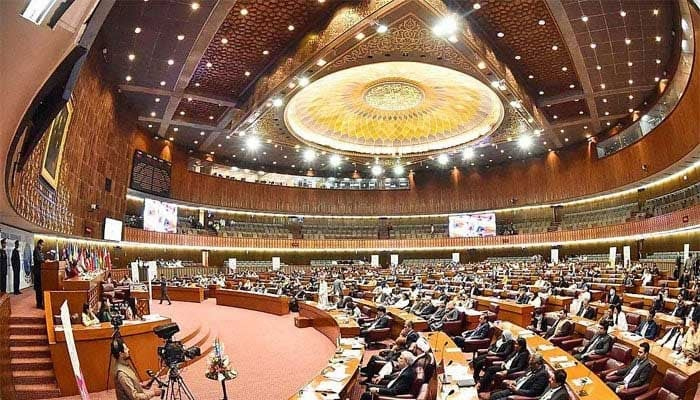Senate held 64 actual sittings in 2023-24 parliamentary year
ISLAMABAD: The Senate of Pakistan has furnished its report on completion of the parliamentary year, showing that a total of 10 sessions were held, while the total time of the sittings was calculated at 152 hours and 58 minutes, with an average of 2 hours and 35 minutes consumed by each sitting.
The 185-page report says that during the parliamentary year, the total number of working days of the House were 112, whereas the actual sittings stood at 64 days. As many as 12 days were attributed to the private members as private members’ days.
The percentage of members’ attendance, during the parliamentary year 2023-24, was recorded at 55pc. Senator Shahadat Awan of the PPP topped the list with 63 total attendances, followed by Senator Tahir Bizenjo of the National Party and JUI-Fazl’s Kamran Murtaza with presence in 61 and 59 sittings, respectively.
On the legislative side, one ordinance was laid before the Senate during the parliamentary year; 14 government bills presented in Senate and passed while three government bills were still pending in the standing committees concerned.
Likewise, 99 private members’ bills were presented in the House, out of which 29 were passed and 53 bills were pending with the standing committees due to technical reasons. Moreover, 31 private members’ bills were received from the National Assembly, which lapsed and returned to the National Assembly on its dissolution.
According to the report, total starred questions were 2015, while admitted questions were recorded at 1,454, whereas disallowed questions were 271. Lapsed questions (due to repetition/irrelevancy were 290, while replied questions were 525: referred to the standing committees 26; deferred questions 19 and admitted but lapsed questions were 1,084 and total unstarred questions were 118.
Similarly, a total of 65 points of public importance were addressed, showcasing the Senate’s responsiveness to the concerns and needs of the public. Regarding the work of House standing committees, the report says that the commitment of committee’ members has been instrumental in advancing the legislative agenda and addressing critical national issues.
Total meetings held of the standing committees were 290, whereas reports on matters referred by the chairman Senate in public petitions were 37. The Senate Standing Committee on Finance and Revenue tops the list with the most meetings held.
The Senate successfully resolved 45 public petitions and matters referred by chairman Senate, reflecting its commitment to providing a platform for citizens to voice their grievances and seek redress. A total of 710 public petitions were received. After approval by the chairman Senate on admissibility, 145 petitions were referred to Senate committees concerned. Out of these, 60 petitions were disposed of by the committees and 85 are still pending with committees to be finalised.
Likewise, 565 petitions were found inadmissible after scrutiny. Moreover, 77 petitions were referred to the House committee on Interior, 19 were referred to Education and Professional Training and 15 were referred to the Power Committee.
The Senate focused on boosting efficiency and transparency: For the first time, live tickers were run during the Senate session while up-gradation of broadcasting and post-production was carried out.
“The Senate of Pakistan takes pride in its active engagement with international delegations and the initiation of Parliamentary Diplomacy initiatives. These endeavours contribute to fostering diplomatic relations and promoting collaboration on global issues,” the report says and the Senate of Pakistan continues its commitment to transparency, accountability and service to the nation.
-
 Chinese New Year Explained: All You Need To Know About The Year Of The Horse
Chinese New Year Explained: All You Need To Know About The Year Of The Horse -
 Canadian Passport Holders Can Now Travel To China Visa-free: Here's How
Canadian Passport Holders Can Now Travel To China Visa-free: Here's How -
 Glen Powell Reveals Wild Prank That Left Sister Hunting Jail Cells
Glen Powell Reveals Wild Prank That Left Sister Hunting Jail Cells -
 Edmonton Weather Warning: Up To 30 Cm Of Snow Possible In Parts Of Alberta
Edmonton Weather Warning: Up To 30 Cm Of Snow Possible In Parts Of Alberta -
 'A Knight Of The Seven Kingdoms' Episode 5: What Time It Airs And Where To Stream
'A Knight Of The Seven Kingdoms' Episode 5: What Time It Airs And Where To Stream -
 Amy Schumer Drops Cryptic Message On First Valentine Amid Divorce
Amy Schumer Drops Cryptic Message On First Valentine Amid Divorce -
 Savannah Guthrie Sends Desperate Plea To Mom Nancy Kidnapper
Savannah Guthrie Sends Desperate Plea To Mom Nancy Kidnapper -
 NBA All-Star 2026 Shake-up: Inside The New USA Vs World Tournament Format
NBA All-Star 2026 Shake-up: Inside The New USA Vs World Tournament Format -
 Warner Bros Consider Reopening Deal Talks With Paramount, Says Reports
Warner Bros Consider Reopening Deal Talks With Paramount, Says Reports -
 Andrew Mountbatten Windsor Faces Future With UK MPs, Says Expert
Andrew Mountbatten Windsor Faces Future With UK MPs, Says Expert -
 Eva Mendes Shared Bedroom Photos For Ryan Gosling On Valentine’s
Eva Mendes Shared Bedroom Photos For Ryan Gosling On Valentine’s -
 Shamed Andrew Told 'nobody Is Above The Law' Amid Harrowing Silence
Shamed Andrew Told 'nobody Is Above The Law' Amid Harrowing Silence -
 Gisele Bundchen Melts Hearts With Sweet Bike Ride Glimpse Featuring Son
Gisele Bundchen Melts Hearts With Sweet Bike Ride Glimpse Featuring Son -
 Prince William Found Meghan Markle ‘quite Refreshing’ At Start
Prince William Found Meghan Markle ‘quite Refreshing’ At Start -
 Kate Middleton Knew Should Could Not Be ‘voice Of Reason’ With Prince Harry
Kate Middleton Knew Should Could Not Be ‘voice Of Reason’ With Prince Harry -
 Rihanna Has Wardrobe Malfunction At A$AP Rocky Fashion Show
Rihanna Has Wardrobe Malfunction At A$AP Rocky Fashion Show




